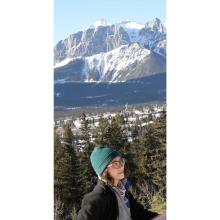Cal Rosete
Why did you decide to pursue a graduate degree?
Neuroscientists know very little about the brain — a fact that is simultaneously ironic, curious and thrilling. With each discovery comes dozens of new questions, which lead to answers that continue this never-ending process. I decided to pursue a graduate degree because I can’t help but be curious about the infinite number of unknowns about the cellular and molecular underpinnings of behaviour. However, I would have never discovered this love for neuroscience if not for my mother, Jenny, who struggled with her mental health. Little did she know, my love for her planted an interest in how the brain works. It is through graduate research where we can stand at the edge of our knowledge of the brain and behaviour, an exciting and honouring boundary which I hope to push to improve care and treatment for those experiencing mental health difficulties or illness.
Why did you decide to study at UBC?
What initially drew me to UBC was its proximity to my hometown, Calgary, Alberta, but it was the nature and research topics that convinced me to stay for graduate school. Nothing beats evenings at the beach, or being a short ferry away from a weekend on the Gulf Islands. But during the week, I get to contribute to unique neuroscience research with guidance from the behavioural neuroscience faculty, all of whom are highly accomplished and hold a diverse set of expertise. Notably, my current principal investigator (PI) investigates epigenetic modifications in microglia: an incredibly interesting and rare subject area that I am thrilled to contribute to!
What is it specifically, that your program offers, that attracted you?
Community and friendship has become an increasingly important aspect of my own life, especially with the start of graduate school. The Biochemistry and Molecular Biology department at UBC offers a constructive community that has supported me in my research and my life outside of science.
What was the best surprise about UBC or life in Vancouver?
Perhaps a strange answer, but the public transit in Vancouver is delightful! My more conventional answer is the number of opportunities to meet new people through outdoor activities like rock climbing, biking and hiking. Many people at UBC are keen to get out in nature with soon-to-be friends.
What aspects of your life or career before now have best prepared you for your UBC graduate program?
During my undergraduate degree, I got the opportunity to complete two theses through the Honours Behavioural Neuroscience program at UBC. This was my first true exposure to neuroscience research, and I was immediately hooked. Through the honours program, I gained experience working at the lab bench, independently designing experiments and presenting my research to fellow students at conferences. Without the honours program, I would not have the connections, skills nor the love for research that I hold today.
What do you like to do for fun or relaxation?
When I’m not in the lab, you’ll probably find me biking through the streets of Vancouver or bikepacking on the Gulf Islands! I’ve also taken up weightlifting, climbing and painting to unwind from stressful weeks.
What advice do you have for new graduate students?
Planning is part of the process! Sitting down to lay out experiments, work out the little details, and understand the protocol is just as productive as doing the experiment. Rushing into experiments can be a recipe for disaster if you don’t take the time to go into the nitty gritty (which will be much longer than you’d expect). Also, I’ve learned that your relationship with your supervisor is so important! I am very lucky to have a PI who is endlessly supportive and receptive to my needs in the lab and my project. Understanding the mentorship style that works best for you can definitely help you choose a PI that can give you the support you need to thrive.
Learn more about Cal's research
My research investigates how stress and adversity during development may lead to major depressive disorder in adulthood through the lens of the neuroimmune system. The brain and body are separated through the blood brain barrier, which is hypothesized to increase in permeability under chronic psychological stressors. This “leaky barrier” may give rise to infiltration with circulating inflammatory signals, causing damage which may increase the risk of developing major depressive disorder later in life. Microglia, the brain resident immune cells, are crucial for modulating the brain’s immune response but also contribute to maintaining blood brain barrier integrity and healthy brain development. These cells lie at the centre of this research project, as they have yet to be explored as a therapeutic target for preventing blood brain barrier infiltration in stress-induced mood disorders.



